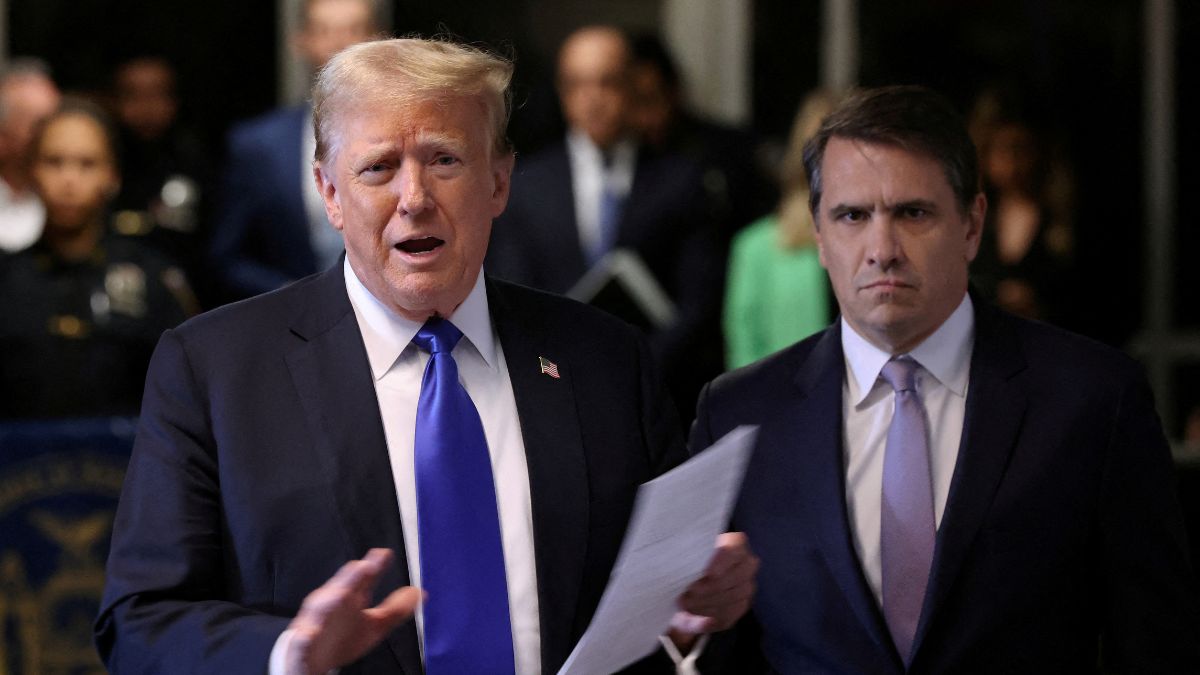On Monday, Donald Trump faced a significant setback in his ongoing legal battle regarding the hush money payment made to adult film star Stormy Daniels, as a judge ruled against dismissing his conviction in light of the US Supreme Court’s decision on presidential immunity.
The ruling from Manhattan Judge Juan Merchan reinforces the severity of the case, as Trump, who is set to take office again on January 20, 2025, continues to confront the fallout of this legal matter.
His lawyers had sought to have the conviction tossed out, arguing that the Supreme Court’s immunity ruling concerning presidential acts should shield him from prosecution. However, the judge sided with Manhattan District Attorney Alvin Bragg’s office, dismissing the notion that presidential immunity applied to this particular case.
Trump’s legal team had sought to have the case thrown out based on the premise that the evidence presented in his trial was tied to his official duties as president. They claimed that materials such as Trump’s presidential financial disclosure forms, testimony from White House aides, and social media posts made during his tenure in office had been improperly used.
However, Judge Merchan ruled in a detailed 41-page decision that the evidence in question was unrelated to Trump’s official conduct and instead dealt with “wholly unofficial conduct,” specifically the falsification of business records to cover up the hush money payment to Daniels.
In his ruling, Merchan stated that even if some of the contested evidence were tied to Trump’s official duties, it would still not warrant the dismissal of the case.
“Even if this Court did find that the disputed evidence constitutes official acts under the auspices of the Trump decision, which it does not, Defendant’s motion is still denied as introduction of the disputed evidence constitutes harmless error,” Merchan wrote, citing the overwhelming evidence of Trump’s guilt.
Trump spokesperson Steven Cheung reacted strongly to the decision, calling it a “direct violation of the Supreme Court’s decision on immunity, and other longstanding jurisprudence.” He further argued that the case was a “lawless” attempt to interfere with Trump’s political career.
“This lawless case should have never been brought, and the Constitution demands that it be immediately dismissed,” Cheung said.
The hush money payment conviction
The case centers on a $130,000 payment made by Trump’s former lawyer, Michael Cohen, to Stormy Daniels just before the 2016 presidential election. Daniels claimed to have had a sexual encounter with Trump a decade earlier, which Trump denies.
The payment was made to prevent Daniels from going public with her story and potentially damaging Trump’s campaign. In May 2023, a Manhattan jury found Trump guilty of 34 counts of falsifying business records in an effort to conceal the payment.
Trump has steadfastly denied any wrongdoing, asserting that the case was politically motivated and aimed at damaging his 2024 presidential bid. “This is an attempt by Bragg, a Democrat, to harm my 2024 campaign,” Trump declared following his conviction.
This ruling makes Trump the first former president, and only the second sitting or former US president in history, to be convicted of a criminal offence.
What it means for Trump now
The timing of the case is especially significant due to the Supreme Court’s recent ruling that ex-presidents are immune from prosecution for actions performed in the course of their official duties. This ruling clarified that such immunity does not extend to unofficial, personal acts.
Trump’s legal team had argued that evidence presented during his trial, such as social media posts and conversations with aides while in the White House, improperly linked his personal conduct to his official role. However, Judge Merchan rejected this argument, affirming that the case centered on Trump’s personal actions, which were not shielded by presidential immunity.
“The Supreme Court’s decision specifically concluded that not everything the president does is official,” Merchan noted. “Trump’s social media posts, for example, were personal.” The judge also pointed to a prior federal court ruling that categorised the hush money payment and subsequent reimbursements as part of Trump’s private life, not his presidential duties.
What next steps may look like
Despite Monday’s ruling, the overall trajectory of the case remains uncertain. Trump’s legal team is still pursuing other avenues to have the conviction overturned.
One such motion centers on the idea that Trump, now elected president once again, should not face a criminal conviction while in office. This motion has not yet been ruled on by Merchan, and it is unclear when or whether a sentencing date will be set.
Trump’s defence attorneys have argued that any criminal proceedings against him during his presidency would cause “unconstitutional disruptions.” They also proposed that the conviction be entirely dismissed, arguing that the case should never have been brought to trial in the first place.
Prosecutors, however, have suggested several options to preserve the conviction, such as freezing the case until Trump leaves office or modifying the sentence to exclude jail time.
Trump’s legal woes are far from over. In addition to this hush money case, Trump is facing multiple other criminal cases, including federal charges related to his efforts to overturn the 2020 election and his handling of classified documents. A separate state case in Georgia concerning election interference also remains in limbo.
Why Trump’s position in unique
As Trump prepares to return to the White House next month, his legal troubles continue to cast a shadow over his presidency. He is the first former president to be convicted of a felony and remains the first criminal to be elected back to the presidency.
This legal battle is likely to continue throughout his second term, with many speculating that the case could stretch out for months or even years. Trump’s team is expected to file an appeal, which could further delay any final resolution.
With inputs from agencies


)

)
)
)
)
)
)
)
)



